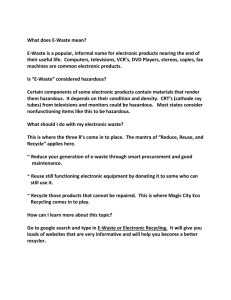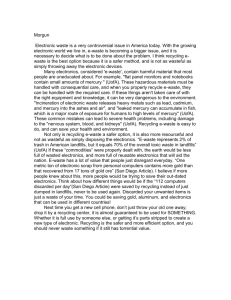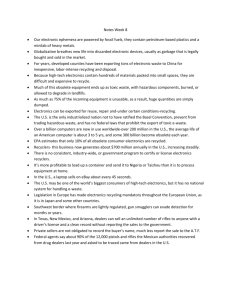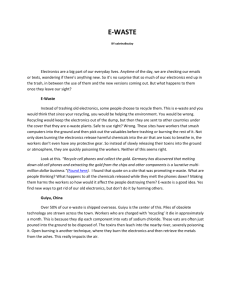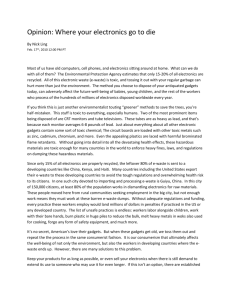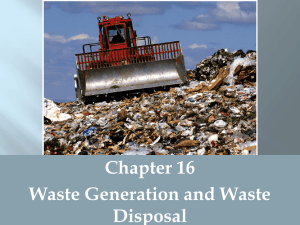E-Waste Hazards: Recycling & Environmental Impact
advertisement
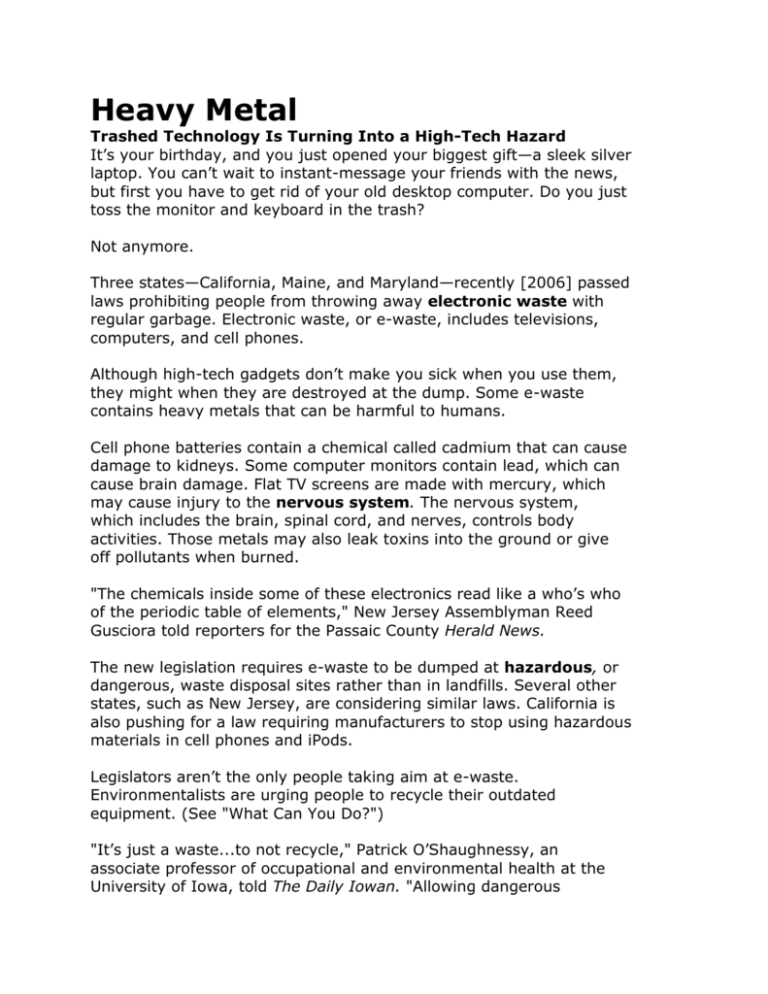
Heavy Metal Trashed Technology Is Turning Into a High-Tech Hazard It’s your birthday, and you just opened your biggest gift—a sleek silver laptop. You can’t wait to instant-message your friends with the news, but first you have to get rid of your old desktop computer. Do you just toss the monitor and keyboard in the trash? Not anymore. Three states—California, Maine, and Maryland—recently [2006] passed laws prohibiting people from throwing away electronic waste with regular garbage. Electronic waste, or e-waste, includes televisions, computers, and cell phones. Although high-tech gadgets don’t make you sick when you use them, they might when they are destroyed at the dump. Some e-waste contains heavy metals that can be harmful to humans. Cell phone batteries contain a chemical called cadmium that can cause damage to kidneys. Some computer monitors contain lead, which can cause brain damage. Flat TV screens are made with mercury, which may cause injury to the nervous system. The nervous system, which includes the brain, spinal cord, and nerves, controls body activities. Those metals may also leak toxins into the ground or give off pollutants when burned. "The chemicals inside some of these electronics read like a who’s who of the periodic table of elements," New Jersey Assemblyman Reed Gusciora told reporters for the Passaic County Herald News. The new legislation requires e-waste to be dumped at hazardous, or dangerous, waste disposal sites rather than in landfills. Several other states, such as New Jersey, are considering similar laws. California is also pushing for a law requiring manufacturers to stop using hazardous materials in cell phones and iPods. Legislators aren’t the only people taking aim at e-waste. Environmentalists are urging people to recycle their outdated equipment. (See "What Can You Do?") "It’s just a waste...to not recycle," Patrick O’Shaughnessy, an associate professor of occupational and environmental health at the University of Iowa, told The Daily Iowan. "Allowing dangerous [chemicals] to leach1 into the environment for decades seems irresponsible." What Can You Do? Reduce. Be a responsible shopper, and take care of your electronics so they will last longer. Reuse. Donate or sell your old high-tech gadgets. Schools and community centers often accept donations of electronic equipment. Recycle. To find a responsible recycler, contact a local or state environmental group. 1 leach: to carry off by dissolving soluble components in a liquid; to mix with water and spread out “Heavy Metal” Questions ___ 1. The main idea of this passage is that a. electronic waste includes televisions, computers, and cell phones. b. electronic waste that is not properly thrown out can be harmful to humans. c. in Maine it is against the law to dump hazardous waste in landfills. d. the mercury in flat TV screens may cause injury to the nervous system. ___ 2. The main idea of the “What Can You Do” box is that a. reusing and recycling electronics can decrease pollution. b. electronic waste can have harmful effects on humans. c. hazardous materials come from electronics. d. people should reduce, reuse, and recycle electronics. ___ 3. Based on the text, how might electronic waste thrown out in landfills impact the nearby environment? a. It might increase the number of animals living in the environment. b. It might reduce the level of toxins in the ground of the environment. c. It might pollute the environment. d. It might reduce pollution in the environment. ___ 4. Mercury can injure the nervous system. According to the text, what does the nervous system do? a. The nervous system digests food. b. The nervous system circulates blood. c. The nervous system controls body activities. d. The nervous system fights diseases. ___ 5. Select a detail from the text and explain how it supports the main idea.
